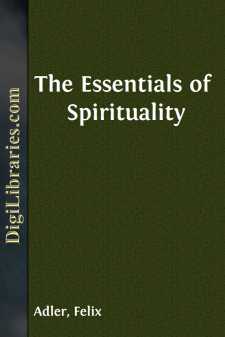Categories
- Antiques & Collectibles 13
- Architecture 36
- Art 48
- Bibles 22
- Biography & Autobiography 813
- Body, Mind & Spirit 142
- Business & Economics 28
- Children's Books 14
- Children's Fiction 11
- Computers 4
- Cooking 94
- Crafts & Hobbies 4
- Drama 346
- Education 46
- Family & Relationships 57
- Fiction 11829
- Games 19
- Gardening 17
- Health & Fitness 34
- History 1377
- House & Home 1
- Humor 147
- Juvenile Fiction 1873
- Juvenile Nonfiction 202
- Language Arts & Disciplines 88
- Law 16
- Literary Collections 686
- Literary Criticism 179
- Mathematics 13
- Medical 41
- Music 40
- Nature 179
- Non-Classifiable 1768
- Performing Arts 7
- Periodicals 1453
- Philosophy 64
- Photography 2
- Poetry 896
- Political Science 203
- Psychology 42
- Reference 154
- Religion 513
- Science 126
- Self-Help 84
- Social Science 81
- Sports & Recreation 34
- Study Aids 3
- Technology & Engineering 59
- Transportation 23
- Travel 463
- True Crime 29
The Essentials of Spirituality
by: Felix Adler
Categories:
Description:
Excerpt
The Essentials of Spirituality
The first essential is an awakening, a sense of the absence of spirituality, the realized need of giving to our lives a new and higher quality; first there must be the hunger before there can be the satisfaction.
Similar effects are often produced by widely differing processes. In the psychical world that quality which we call spirituality may be associated with and evoked by Theism, or the belief in a Divine Father; by Pantheism, as in the case of Spinoza, whose face at the very first glance impresses you with its spiritual cast; or even by the Buddhist belief in Nirvana. It may also be attained by following the precepts and striving after the ideals of Ethical Culture. For spirituality is not indissolubly associated with any one type of religion or philosophy; it is a quality of soul manifesting itself in a variety of activities and beliefs.
Before we proceed further, however, we must hazard a definition of the word. In the region of mental activity which is called the spiritual life vagueness is apt to prevail, the outlines of thought are apt to be blurred, the feelings aroused are apt to be indistinct and transitory. The word 'spiritual' becomes a synonym of muddy thought and misty emotionalism. If there were another word in the language to take its place, it would be well to use it. But there is not. We must use the word 'spiritual,' despite its associations and its abuse. We shall endeavor, however, to attach a distinct and definite meaning to the word. Mere definition, however, is too abstract and nakedly intellectual. Perhaps a description of some types of character, combined with definition, will be the better way.
Savonarola is surely one of the commanding figures in history. His fiery earnestness, his passion for righteousness, the boldness with which he censured the corruptions of the Roman Court, the personal qualities by which he—a foreigner and a mere monk—made himself for a short period the lawgiver, the prophet, and virtually the dictator of Florence—that Florence which was at the time the very gemmary of the Renaissance—his sudden fall and tragic death; all combine to attract toward him our admiration, pity, and love, and to leave upon our minds the impression of his extraordinary moral genius. And yet, though a spiritual side was not wanting in Savonarola, we should not quote him as an outstanding exemplar of spirituality. The spiritual life is unperturbed and serene. His nature was too passionate, he was too vehement in his philippics, too deeply engrossed in the attainment of immediate results, too stormy a soul to deserve the name of spiritual.
Again, our own Washington is one of the commanding figures in history. He achieved the great task which he set himself; he secured the political independence of America. He became the master builder of a nation; he laid securely the foundations on which succeeding generations have built. He was calm, too, with rare exceptions; an expert in self-control. But there was mingled with his calmness a certain coldness....


